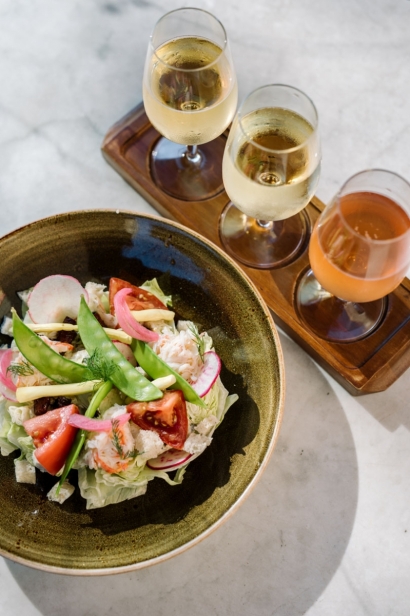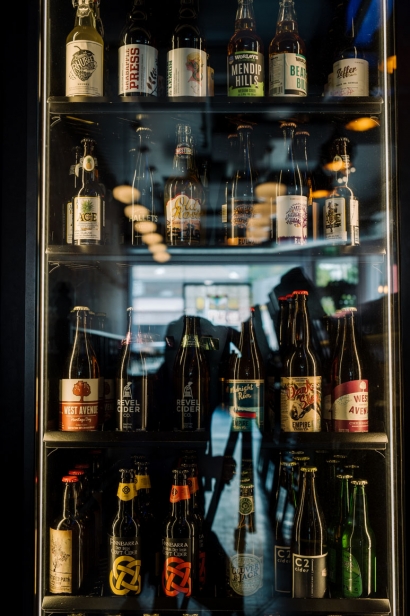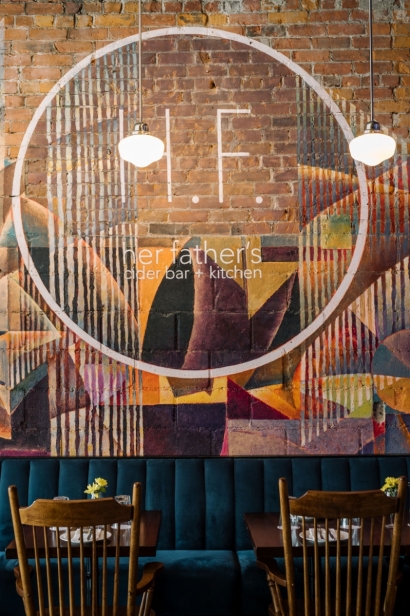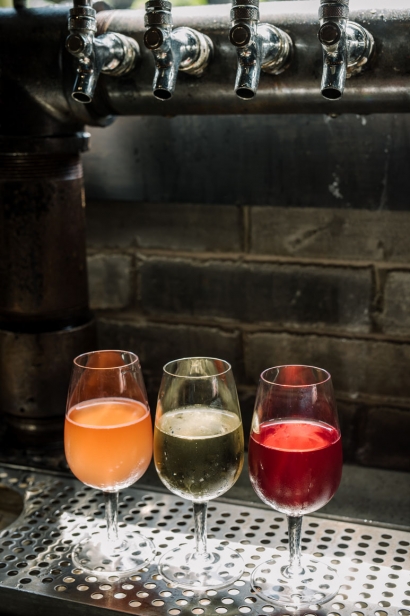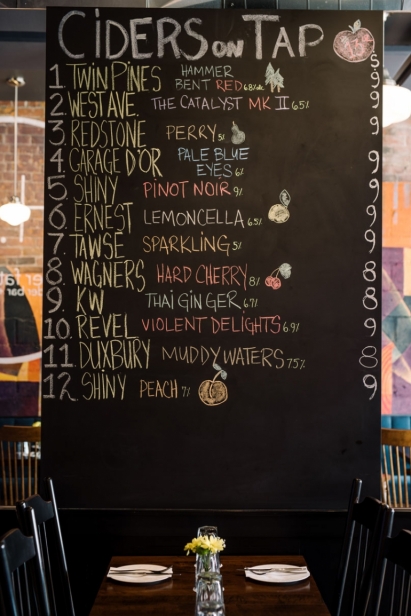The Great Wall of Cider
Hard cider is to apples what wine is to grapes — boozy, fermented fruit juice. An over-simplified definition, but cider tends to be a blind spot for drinkers, making it a key sticking point for Ontario craft cider-makers trying to get noticed in the bustling business of local booze. Thankfully, the industry is in the midst of a boom. Cider sales in Ontario continue to grow by approximately 50 per cent year over year and with this boom comes a chance to show the public what cider truly is and can be.
Enter Her Father’s Cider Bar + Kitchen. The first thing you'll notice as you step inside is the refrigerated wall of cider — filled floor to ceiling with bottles of cider illuminated by bright neon boxes. This isn't just a fridge — it’s a statement. With one look you realize that cider is so much more than you ever thought it was — and that’s exactly what Joshua Mott wants.
“The reception has been phenomenal,” says Mott, owner of Her Father’s, which opened in historic Harbord Village a little more than a year ago. “People can’t believe that there’s this much cider in the world — and it’s just a fraction of what’s actually out there. There’s a whole German apfelwein region that doesn’t make an appearance in here.” What there is on the extensive cider list are examples from France, Spain, England, Ireland, New Zealand, South Africa, the United States, and of course, Canada. All in all, there are over 150 ciders on offer, all of which contain only apples, a far cry from the many apple-flavoured coolers touted as cider on the market. The 12 rotating ciders available on tap come mostly from Ontario craft cideries, with more available by the glass and bottle.
Beyond the cider list, Her Father’s offers a small, but well curated selection of wines and local craft beers for those who aren’t quite ready to dive head first into the cider pool. You can also choose from a handful of cocktails most of which contain either cider or calvados, that underrated spirit derived from apples.
The all-things-apple theme continues into the seasonal menus which, thanks to chef Ryan Barclay, avoid becoming tacky messes of appleness. Sure there are dishes like Cornish rock hen in cider with mussels, chanterelles, endives and calvados jus. But there are also dishes in which there is not an apple to be found, such as Barclay’s seared duck breast with rye spaetzle and carrot purée. Even though the apples can’t necessarily be found in the dish itself, ciders at Her Father’s are obviously the beverage of choice for pairing.
“The way we’ve positioned ourselves here is cider as an alternative to wine,” says Mott, stressing that white wines and ciders can often be swapped without anyone crying foul. Seafood and sweet ciders, such as Spirit Tree’s Draught Cider, are great friends. Even red meat dishes pair well with dry and funky ciders, such as Pommies’ Farmhouse Cider.
“It made sense to pair great cider with great food. We could just sling cider from a tap and serve it with burgers, fries and nachos — fall into line with what has been traditionally established with what cider is. I’m glad that we’re holding the product to its highest standard and that we’re doing justice to the craft and the people who make it.”
Unfettered by centuries of tradition like in Europe, and in good North American fashion, Ontario cider producers are finding their own way to challenge people’s perceptions of cider.
“Right now Ontario cider styles vary widely,” says Thomas Wilson, chair of the Ontario Craft Cider Association (OCCA) and co-owner and general manager of Spirit Tree Estate Cidery in Caledon. “Some are focussing on clean, crisp New World ciders using fresh eating apples. Other producers are experimenting with classic European-style ciders and funky craft ciders to find new and interesting recipes. The ciders you see at Evergreen Brickworks' annual Cask Days Festival in October are a perfect example of strange and wonderful craft ciders.”
One example of this experimental predisposition on Her Father’s draught list is West Avenue Cider House’s Legend of the Fall. Its sour funk calls to mind the sidras of Spain. “If you like sour beers,” Mott says, “you’d like Spanish ciders because that’s sort of the effect they’re going for. Citrus, more tannins, less body and more punch to the palate. In Europe, it’s much more defined. There might even be an appellation associated with the cider that you’re making. It’s therefore going to be a lot more distinguishable to a palate.”
If Europe has a more established cider tradition, it is in part because they were unaffected by the United States’ prohibition era. During these lamer years of the roaring '20s, prohibitionists cut down most cider apple trees. Decades later, North America is only just recovering from this blow.
According to Wilson, “OCCA is currently conducting a multiyear project in partnership with the University of Guelph and funded by the Agricultural Adaptation Council to study five research blocks planted throughout Ontario, including the Simcoe Research Station, to study European and heritage North American cider apples. Heritage apples we are looking at include Golden Russet, Egremont Russet, Tolman Sweet, Hewes Crab, Geneva and Chestnut Crab.”
The greater the variety of cider apple trees, the greater the potential for Ontario ciders because blending different kinds of apple juices is common in cider making. A good cider maker will strive for the perfect balance of acids, sugars and tannins in order to produce an interesting cider with complexity and depth. More often than not, they must also know the ins and outs of the orchardist’s trade.
As if producing cider wasn’t demanding enough, cideries must also contend with the trials and tribulations of business, marketing and wrestling with the LCBO. This regulating body is also one of the main parties to blame for the fact that we have little access to the ciders of the world.
“Ontario is the largest apple-growing province in Canada, yet Ontario cider producers only account for seven per cent of the LCBO cider sales this year,” says Wilson. “Foreign cider producers [including products that aren’t actual cider] have dominated the Ontario cider market for the last 10 years, resulting in a significant missed opportunity for economic impact in the province. This is due to the heavy taxes and markups local cider producers face to operate here in Ontario.” And it isn’t just the cideries that are feeling the pain; various fees have the greatest impact on licensees, such as Her Father’s, which are forced to buy at almost retail prices.
The situation isn’t great, but it is improving. In March 2017, the Ontario government announced the new Ontario Small Cidery and Small Distillery Support Program, a $4.9 million investment. The program will provide eligible cideries with payments of 74 cents per litre to a maximum of $220,000 per year based on eligible sales. These funds will help alleviate financial pressure on cideries, but, according to Wilson, the program is not quite as supportive as the hugely successful Ontario Craft Beer Program.
Unlike beer and wine, cider is relatively new to the Ontario alcohol game. Legislators and civil servants seem to be at a loss for what to do. “Cideries are licensed as wineries when they are more similar to breweries (alcohol content and packaging),” Wilson specifies. “We have asked the government to consider a separate cidery licence, but they are not interested at this point. On top of this, the craft breweries enjoy less taxes thanks to the Craft Beer Program, allowing them to be more aggressive in their marketing to consumers."
And although OCCA has much work to do in the jungle of red tape, none of that is apparent at Her Father’s Cider Bar + Kitchen.
Her Father's Cider Bar + Kitchen
119 Harbord St., Toronto, Ont.
herfathers.ca, 647.347.7747
Ontario on Tap
Her Father's Cider Bar + Kitchen offers 12 different ciders on tap, mainly from within the province. And while the list changes often, we recommend these frequent favourites:
Sparkling Cider Tawse Winery, Vineland ABV 5.5% | Apple varieties: McIntosh, Empire, Northern Spy, Crispin, Gala
Tasting notes: Notes of baked apple, pie crust and sweet spices. Soft effervescence on the palate with crisp apple flavours. Clean and balanced with a touch of sweetness on the finish.
Legend of the Fall West Avenue Cider House, Freelton ABV 6.9% | Apple varieties: McIntosh, Cortland, Spartan, Empire
Tasting notes: Sourness of Spanish-style sidras. Light barnyard, sweet apple, dry finish and tart-sweet balance. Silver winner at the 2017 Great Lakes International Cider and Perry GLINTCAP Competition in the sour cider category.
Beaver Valley Flagship Beaver Valley Orchard & Cidery, Kimberley ABV 7% | Apple varieties: Golden Russet, Tolman Sweet, Snow, Roxbury Russet, Wealthy
Tasting notes: Bone dry. Fresh and lively with subtle notes of vanilla and spice. Bronze Winner at the 2017 GLINTCAP Competition in the heritage cider (dry) category.
Shiny Apple Cider with Pinot Noir Small Talk VIneyard, Niagara- On-The-Lake ABV 9% | Apple varieties: Red Delicious, Northern Spy, McIntosh, Gala, Empire, Honeycrisp, Cortland
Tasting notes: Full apple complexity with notes of strawberry, plum and candied fruit. Gold winner of the 2017 GLINTCAP Competition in the specialty category.
Thai Ginger Cider KW Craft Cider, Kitchener/Waterloo ABV 6.7% | Apple varieties: Golden Russet, Ida Red, Northern Spy, Empire, McIntosh
Tasting notes: Ginger, sweet apple and spicy green pepper aromas and flavours. Reminiscent of pickled sweet peppers. Medium spicy. Good balance between head and sweetness with a touch of acidity. Silver winner at the 2016 GLINTCAP Competition in the specialty category.



